Real estate crowdfunding has emerged as a game-changer in the investment world, providing access to lucrative property opportunities with minimal capital. According to recent statistics, the global real estate crowdfunding market is projected to grow at a CAGR of 33.4% between 2023 and 2030, driven by increased accessibility and digital innovation. This investment model allows individuals to diversify their portfolios while benefiting from the stability of real estate—all without the headaches of direct property management.
However, like any investment, it comes with its risks. In this article, we’ll explore the best platforms for 2025, discuss the benefits and considerations of real estate crowdfunding, and provide actionable advice to help you get started. Whether you’re a beginner or an experienced investor, this guide is your comprehensive resource for navigating the world of real estate crowdfunding.
Real Estate Crowdfunding for Beginners
Was ist Immobilien-Crowdfunding?
Imagine pooling resources with hundreds, perhaps thousands, of investors to finance a high-value property development—that’s real estate crowdfunding. By aggregating smaller contributions, platforms unlock participation in projects previously reserved for large-scale developers or private equity funds. Real estate crowdfunding allows multiple investors to pool resources for property projects, democratizing access to large-scale developments with small contributions.
Benefits of Real Estate Crowdfunding
- Accessibility: Platforms like EstateGuru allow investments starting as low as €50, making it easy for beginners.
- Diversification: Invest across multiple properties, regions, and types.
- Passive Income: Generate steady returns without managing properties.
- Flexibility: Choose between short-term and long-term projects.
- Comparative Advantage: Offers higher potential returns than traditional options like REITs or bonds.
Case Study: An investor with €1,000 diversified across five projects on Crowdpear achieved a 10% annual ROI, surpassing returns from stocks.
Expert Insight: “Real estate crowdfunding provides a unique blend of stability and high returns, making it an ideal choice for modern investors,” says Sarah Mitchell, a property investment advisor.
Types of Real Estate Crowdfunding Investments
- Equity-Based Investments: Ownership shares in properties, with returns derived from rental income or property appreciation. Riskier, but often more lucrative.
- Example: A residential redevelopment in Berlin raised €2M, delivering a 15% ROI over 18 months.
- Profis: High potential returns, property ownership.
- Nachteile: Illiquid, higher risk of loss.
- Debt-Based Investments: Fixed-interest loans to developers, secured against property assets. Lower returns but more predictable cash flow.
- Example: A commercial loan in Tallinn provided a 10% annual return with a 65% LTV.
- Profis: Steady income, lower risk.
- Nachteile: Returns capped, no property ownership.
- Hybrid Investments: Blending elements of equity and debt, these offer moderate returns with balanced risk profiles.
- Example: A mixed-use property in Barcelona combined equity and loan components, yielding an 8% annual return.
- Nachteile: Complex structures, variable returns.
- Profis: Diversified income streams, balanced risk.
| Investment Type | Ownership | Returns | Risk | Liquidity |
|---|---|---|---|---|
| Equity-Based | Ja | Rental, Sales | Hoch | Niedrig |
| Debt-Based | Nein | Fixed Interest | Mittel | Mittel |
| Hybrid | Partial | Mixed | Variable | Variable |
The Crowdfunding Process
- Set investment goals (short-term returns, passive income, or long-term growth)
- Research and choose a suitable platform
- Analyze projects (study LTV ratios, projected ROI, and developer track records)
- Start with a small investment to test the platform
- Monitor performance using platform tools
- Receive returns through payouts or property appreciation.
Key Concepts
- ROI (Return on Investment): Measures the profitability of your investment.
- Diversification: Reduces risk by spreading investments across multiple projects.
- Due Diligence: Researching the credibility of platforms and projects.
- Accredited vs. Non-Accredited Investors: Some platforms cater exclusively to accredited investors.
- Secondary Markets: Allow you to sell your investments before maturity, providing liquidity.
How to Choose the Best Real Estate Crowdfunding Platform
The market is saturated with options, but not all platforms are created equal. Selecting the right one requires discernment.
Reputation and Track Record
Consider platforms with proven histories of consistent returns. For instance, EstateGuru has facilitated over €700 million in loans with a default rate below 1%. Numbers like these instill confidence—don’t they?
Investment Minimums
Fundrise, for example, allows entry with just $10, whereas Brickstarter requires a minimum of €50. Lower thresholds provide accessibility, but higher ones may signal more exclusive, carefully vetted opportunities.
Geographic Coverage
Platforms like Crowdpear focus on European markets, while Fundrise dominates in the U.S. Ask yourself: is geographical diversification part of your strategy?
Secondary Markets
Not all platforms allow secondary market trading. For investors seeking liquidity, this feature can be a game-changer. Consider Housers, which offers a robust secondary marketplace.
Tip: Use a trial investment to test a platform’s functionality and reliability before committing significant funds.
Top Real Estate Crowdfunding Platforms for 2025
Beste Immobilien-Crowdfunding-Plattformen: Rangliste
1. EstateGuru
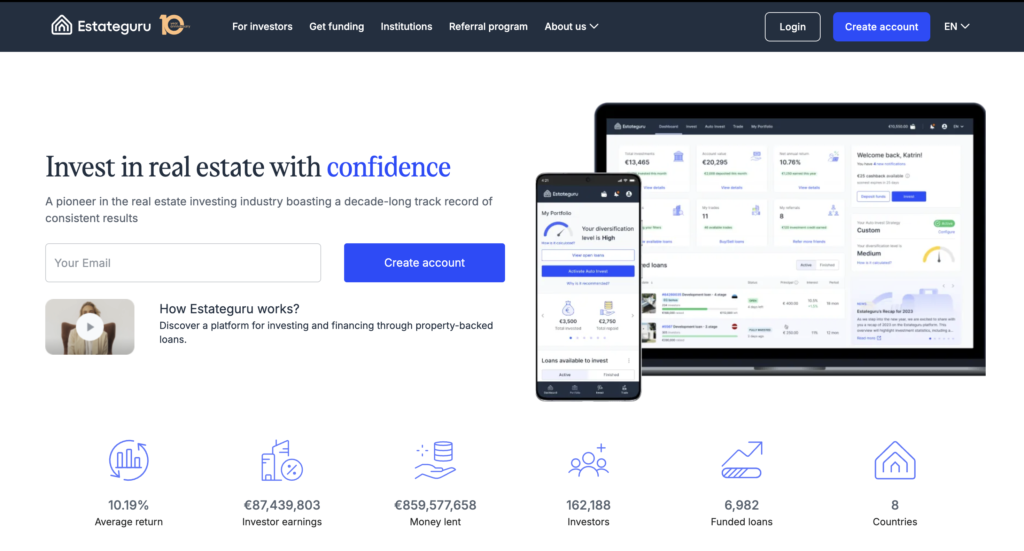
EstateGuru is a prominent peer-to-peer (P2P) lending platform based in Estonia, specializing in real estate-backed loans. P2P lending has revolutionized the finance sector by connecting investors directly with borrowers, offering opportunities for higher returns compared to traditional savings accounts or bonds. With its focus on property-backed loans and a user-friendly platform, EstateGuru has drawn attention from over 150,000 investors across Europe.
Why Choose EstateGuru?
EstateGuru’s unique focus on real estate-backed loans makes it an attractive option for investors seeking tangible collateral. By investing in loans secured by property, investors gain an added layer of security compared to unsecured loans offered by many other platforms.
Key Features and Unique Selling Points
EstateGuru’s features are designed to cater to both novice and experienced investors. Here’s what sets it apart:
- Focus on Real Estate: EstateGuru specializes in property-backed business loans, offering a level of security that appeals to risk-averse investors.
- Investment Accessibility: The platform has a low minimum investment threshold of €50, making it accessible to beginners.
- Auto-Invest Feature: Investors can automate their investments based on predefined criteria, ensuring diversification and ease of use.
- Secondary Market: A secondary market allows investors to liquidate their loans for a 3% fee, adding a layer of liquidity.
- Historically High Returns: The platform has delivered annual returns of 8% to 13%, with a historical average of 10.9%.
- Cross-Border Investment Opportunities: Investors can access projects across multiple European countries, enhancing diversification.
EstateGuru – Best Overall
A European leader specializing in secured loans for real estate projects.
Profis
- Regulated under the ECSP license.
- Low entry barrier with a €50 minimum
- Historically high returns (up to 13%).
- Auto-invest and secondary market features.
Nachteile
- High default rate (€130 million in defaults)
- Slow recovery process for defaulted loans.
- Inactivity fees and other recent fee changes.
2. Indemo
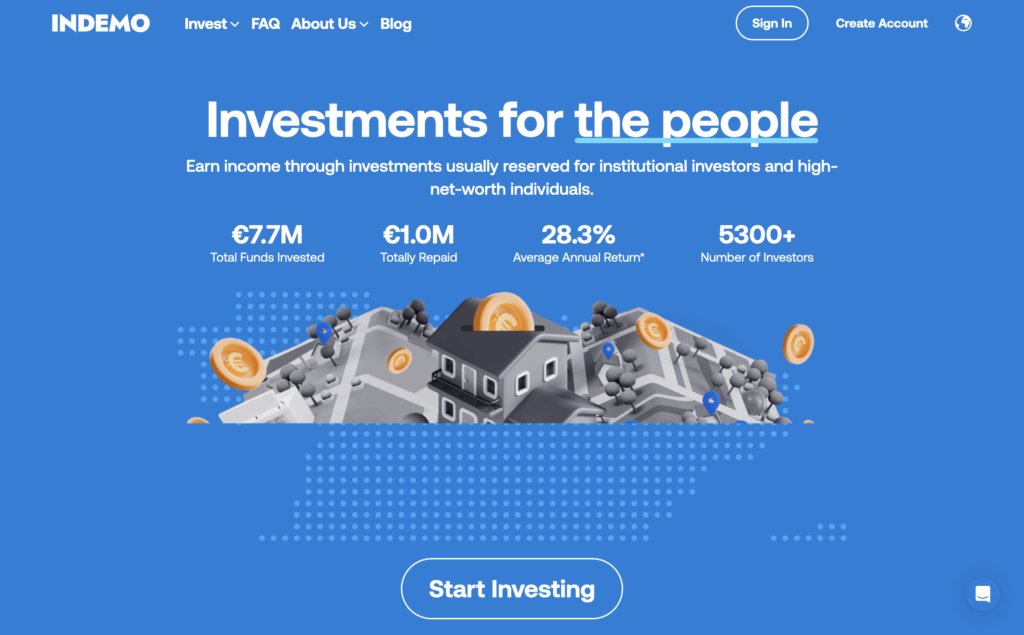
Indemo is a new entrant in the peer-to-peer (P2P) lending space, offering investors an opportunity to explore real estate-backed loans with unique investment options. Launched in 2023 and based in Latvia, Indemo focuses primarily on discounted debt investments (DDIs) and mortgage loans backed by Spanish real estate. Regulated by the Financial and Capital Market Commission of Latvia, Indemo combines innovation and compliance to attract both beginner and seasoned investors.
Why Choose Indemo?
Indemo’s standout feature is its emphasis on discounted debt investments, allowing investors to purchase defaulted loans secured by Spanish real estate at significant discounts. This, combined with its low minimum investment of €10, makes the platform accessible to a wide range of investors seeking high potential returns.
Key Features and Unique Selling Points
Indemo’s features are designed to cater to investors seeking both high returns and security. Here’s what sets it apart:
- Low Minimum Investment: Starting at just €10, Indemo offers a low barrier to entry for beginners.
- Focus on Spanish Real Estate: The platform targets liquid residential markets in Spain, providing geographical focus.
- Innovative Investment Types: Indemo offers both traditional mortgage loans and discounted debt investments.
- Regulated Platform: Compliance with the Financial and Capital Market Commission of Latvia ensures investor protection.
- No Investor Fees: Indemo does not charge fees for investing, maximizing returns.
Indemo – Ideal for first-time investors
Community-focused platform offering innovative property projects.
Profis
- Regulated Platform
- Strong project vetting
- High Potential Returns
Nachteile
- Limited Liquidity
- No Regular Cash Flow
3. Crowdpear
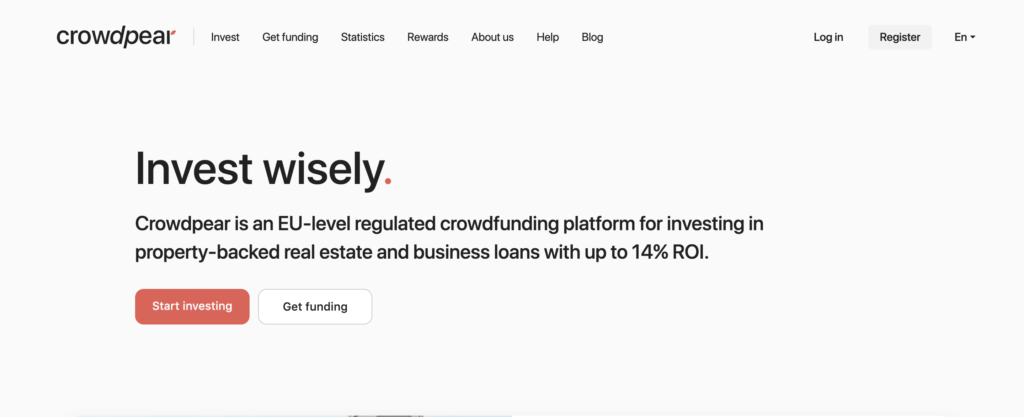
Crowdpear ist eine Crowdlending-Plattform, die ursprünglich in Litauen entwickelt wurde. Sie spezialisiert sich auf die Crowdfunding-Finanzierung von Immobilienprojekten, hauptsächlich in der Hauptstadt Vilnius. Die Plattform bietet Investoren die Möglichkeit, sich an durch erstklassige Hypotheken besicherten Immobilienkrediten zu beteiligen. Dies schafft eine sichere Grundlage für eine attraktive Rendite. Dank der Regulierung durch die Zentralbank von Litauen kombiniert die Plattform Sicherheit mit wettbewerbsfähigen Zinssätzen. Damit ist sie eine hervorragende Option für Anleger, die den europäischen Immobilienmarkt erkunden möchten.
Hauptmerkmale von Crowdpear
The platform only allows investments in mortgage-backed real estate loans. The securities provided should guarantee that any investments made are in safe hands. It is very intuitive for both novice and experienced investors. It offers easy navigation and access to the important information and performance statistics needed to make informed investment decisions.
Zinssätze und Renditen
The interest rates on Crowdpear are 10.5% to 11.5% annually, with a very attractive loyalty program that offers the possibility to increase returns by 1% annually, depending on the amount of investment and time the investor has stayed with the program.
Crowdpear – Offers residential and commercial property investments
Offers residential and commercial property investments.
Profis
- Hohe jährliche Erträge
- Real estate-backed loans
Nachteile
- The focus on just one country
- No auto-invest feature
4. Brickstarter
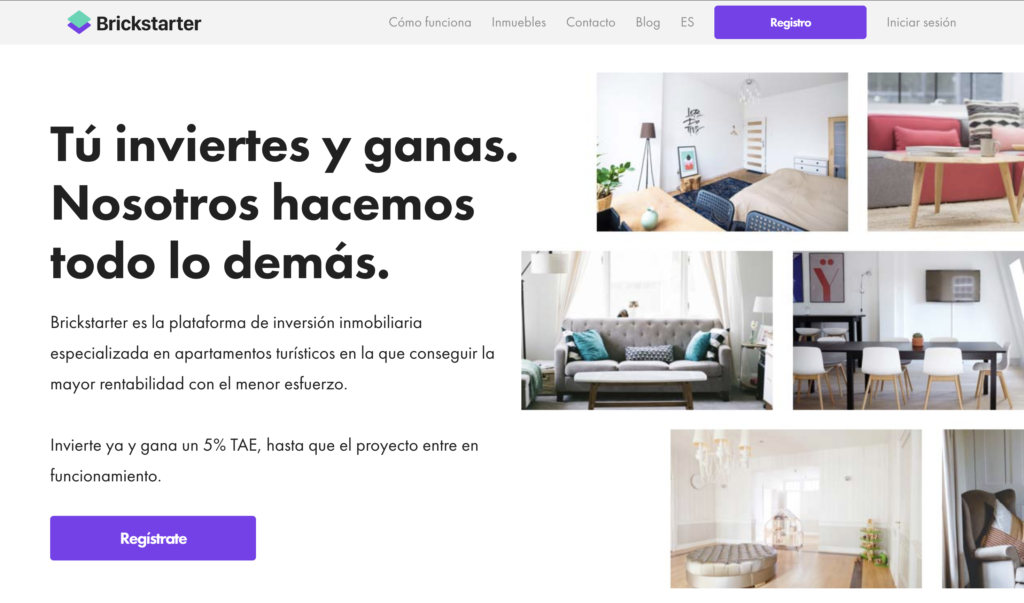
Brickstarter is a real estate crowdfunding platform specializing in vacation rentals in Spain. Founded in 2019 and headquartered in Estonia, Brickstarter targets a niche in the real estate market by focusing on debt-free properties that are renovated and rented through platforms like Airbnb and Booking.com.
Why Choose Brickstarter?
Brickstarter’s unique value proposition lies in its focus on vacation rentals and its use of big data to identify promising properties. By investing alongside its users and ensuring properties are debt-free, Brickstarter aims to minimize risk while maximizing returns.
Key Features and Unique Selling Points
Brickstarter offers several features designed to appeal to investors:
- Focus on Vacation Rentals: Specializes in high-demand vacation rental properties in Spain.
- Big Data Algorithms: Uses data-driven tools to identify and manage profitable properties.
- Debt-Free Properties: All investments are secured by real estate that is free of debt.
- Skin in the Game: Brickstarter invests alongside its users, aligning its interests with those of its investors.
- Low Minimum Investment: Start investing with as little as €50.
BrickStarter – Exposure to the holiday rental market
Specializes in holiday rental properties.
Profis
- Attractive returns (average 10% annually)
- Low minimum investment (€50).
- Focus on vacation rentals
Nachteile
- Limited geographical diversification
- No auto-invest feature
5. Fintown
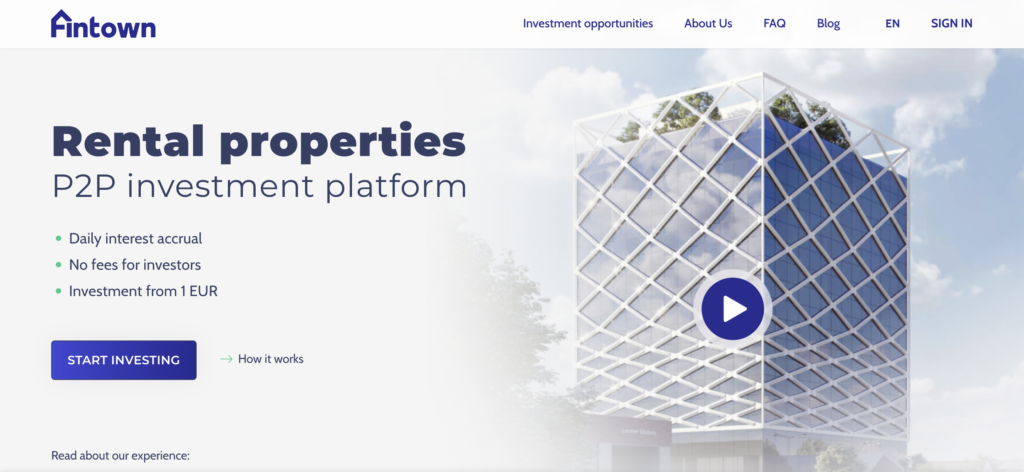
Fintown has thus far located a niche in the P2P investment space by targeting the lucrative, short-term rental market in Prague, Czech Republic. Launched in 2023, the platform has so far managed to attract considerable attention for the investments in high-yield opportunities, varying from 8% to 15% of annual returns.
Key Features of Fintown
Fintown focuses primarily on rental properties in popular locations in Prague, where demand remains high. This very focus opens an opportunity for investors to tap into the demand that exists in the city for both tourism and residential properties. Unlike many other platforms in the P2P space, Fintown at this stage does not include features or offerings such as auto-invest, secondary markets, or buyback guarantees, once again highlighting the niche appeal and straightforward nature of the investment opportunity.
Fintown – Ideal for eco-conscious investors.
Focuses on sustainable and green properties.
Profis
- High loan security
- Diverse projects
Nachteile
- Limited investment diversification
- Nein
Comparative Analysis
| Plattform | Min. Investment | ROI | Gebühren | Diversification | User Experience |
|---|---|---|---|---|---|
| EstateGuru | €50 | 8-12% | Niedrig | Hoch | Excellent |
| Indemo | €100 | 6-10% | Mittel | Mittel | Good |
| Crowdpear | €100 | 7-11% | Niedrig | Hoch | Very Good |
| Brickstarter | €50 | 5-9% | Mittel | Niedrig | Excellent |
| Fintown | €50 | 6-10% | Niedrig | Mittel | Good |
Real Estate Market Analysis
Researching property markets is essential for identifying promising investments. Here’s how:
Key Indicators
- Population Growth: Areas with rising populations often have increased housing demand.
- Economic Stability: Look for regions with strong employment rates and GDP growth.
- Infrastructure Development: Proximity to transport hubs, schools, and hospitals boosts property value.
Tools and Resources
- Local Government Reports: Provide insights into development plans and zoning changes.
- Real Estate Marketplaces: Platforms like Zillow or Rightmove for property price trends.
- Crowdfunding Platform Data: Many platforms publish performance metrics and market analyses.
Risk Assessment for Beginners
Mitigating risk is crucial for long-term success.
Reading Real Estate Lending Risk Ratings
- Loan-to-Value (LTV): A lower LTV (e.g., under 70%) indicates a safer loan.
- Developer Track Record: Experienced developers are less likely to default.
- Risk Ratings: Many platforms assign risk grades; aim for A or B ratings for lower-risk projects.
Diversification Strategies
- Invest across geographies, asset classes, and loan types.
- Avoid allocating more than 10% of your portfolio to a single project.
Risk Assessment Checklist
- Is the LTV below 70%?
- Does the developer have a strong track record?
- Is the platform financially stable?
- Have you reviewed potential regulatory risks?
Tax Implications of Real Estate Crowdfunding
Understanding taxes is vital for maximizing returns.
General Considerations
- Interest Income: Typically taxed as personal income.
- Capital Gains: Taxes may apply to profits from property sales.
- Withholding Taxes: Some countries deduct taxes at the source.
Tax-Efficient Investing
- Utilize tax-advantaged accounts where possible.
- Research double taxation treaties for cross-border investments.
Ressurser
- European Tax Portals: Provide country-specific guidance.
- Tax Advisors: Essential for complex portfolios.
Key Terms and Concepts
- Loan-to-Value (LTV): The ratio of a loan to the property’s value. Lower LTVs (e.g., below 70%) often indicate safer investments.
- Capitalization Rate (Cap Rate): A property’s annual net operating income divided by its market value, representing profitability.
- Net Operating Income (NOI): Revenue from a property minus operating expenses, excluding taxes and interest.
- Return on Investment (ROI): Measures the profitability of your investment.
- Diversification: Spreading investments across multiple projects to reduce risk.
- Due Diligence: Thorough research of platforms and projects before investing.
- Accredited vs. Non-Accredited Investors: Some platforms cater exclusively to accredited investors who meet specific income or net worth criteria.
- Secondary Markets: Allow you to sell investments before maturity, providing liquidity.
Frequently Asked Questions (FAQs)
How do I choose a real estate crowdfunding platform?
Compare features, fees, and reviews.
Can beginners invest into real estate crowdfunding?
Yes, platforms like Indemo are beginner-friendly.
What are the real estate crowdfunding risks?
Potential project failure, illiquidity, and regulatory risks.
How do I mitigate real estate crowdfunding risks?
Diversify and start with secured projects.
What happens if a real estate lending platform shuts down?
Investor funds are typically safeguarded.
Schlussfolgerung
Real estate crowdfunding offers exciting opportunities for portfolio diversification and passive income. By understanding the basics, carefully selecting platforms, and managing risks, investors can potentially achieve attractive returns in the growing real estate market. Start your journey with a small investment on one of the top platforms for 2025 and expand your portfolio as you gain confidence and experience.










